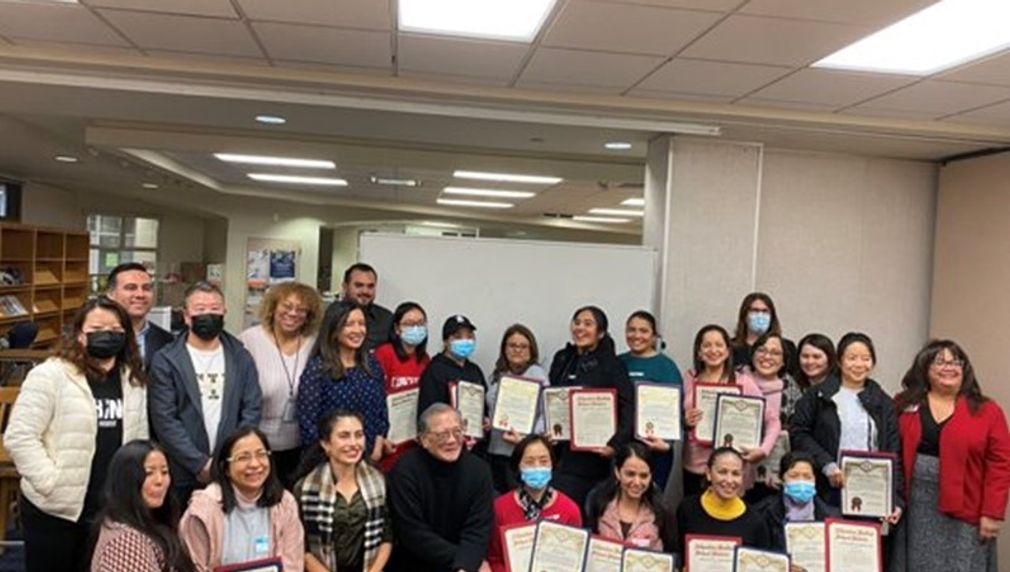AYC Youth & Parent Leadership Development Program
The Asian Youth Center’s Youth & Parent Leadership Development Program supports immigrant/refugee youth and parents to identify and advocate for policy issues that matter most to them. The Parent Education Academy provides English learning and technology skills, utilizing lessons with social justice content and advocacy skills to amplify Asian and Latino immigrant voices and experiences to improve their well-being and address barriers to success, including racism, discrimination, and hate.

What is the primary issue area that your application will impact?
Adult literacy
In which areas of Los Angeles will you be directly working?
San Gabriel Valley
In what stage of innovation is this project, program, or initiative?
Expand existing project, program, or initiative (expanding and continuing ongoing, successful work)
What is your understanding of the issue that you are seeking to address?
According to the 2022 State of Immigrants in L.A. County (SOILA) report, the immigrant population alone makes up over a third of the county population of more than 10 million. This population significantly contributes to the economy and the diverse society as a whole, but have suffered disproportionately from the pandemic, recession, and other negative community conditions. For immigrants and refugees to fully integrate and thrive, they must be given the skills, resources, and support to address language access issues, barriers to social and economic mobility, lack of civic representation and participation, and barriers to naturalization. Giving this underserved group a voice is the first step to opening up the dialogue in L.A. County, starting necessary conversations about issues that matter most to them. Changing system structures to promote justice and opportunity for immigrants and refugees in our economy and all other aspects of society will uplift every community.
Describe the project, program, or initiative this grant will support to address the issue.
The Adult/Parent Education Academy, where youth served as planners, teaching assistants, translators, and interns, assists immigrant parents in learning English and civic engagement. AYC’s mission focuses on meeting the needs of the immigrant community, making resources and services available to those marginalized by oppressive systems and conditions. We facilitate the empowerment of those most impacted by systemic racism and inequity, following their lead on the issues and programs they think would make the biggest difference, recognizing that historically, immigrants have been shut out of decisions impacting their communities. Ensuring that immigrant rights are protected begins with civic engagement opportunities, which are often hindered by citizenship status and language access. The YPLD program ensures that immigrant voices are heard and that their issues are represented properly through community advocacy and input. YPLD works on all aspects of our vision for thriving immigrant youth and families in L.A. County, primarily through its workforce development, staffing, and programming at middle and high school Dream Resource Centers. The centers support undocumented, immigrant, and BIPOC students, their allies, and parents with resources, programs, training, and leadership development. They are spaces for community-led efforts to transform schools into safe, restorative, and compassionate spaces where students, families, and communities can flourish.
Describe how Los Angeles County will be different if your work is successful.
AYC envisions a future where immigrant youth and parents will be leaders and advocates, creating a true shift in power to those impacted by the systems that capitalize in keeping minorities at a disadvantage. By building civic engagement skills at our Dream Centers, immigrants will feel more confident and prepared to directly address community issues. It fosters a sense of belonging to one another, responsibility to their community, and authority over the systems that exist to support them. Parents who feel like they can communicate with schools and local government, share their stories and experiences, and feel empowered to advocate for community changes are less likely to feel hopeless and powerless. They are less likely to suffer from the negative health and mental health impacts of hate and discrimination and more likely to recover quickly. Finaly, they set an example for their children. They will be able to support their children and develop more resiliency.
Approximately how many people will be impacted by this project, program, or initiative?
Direct Impact: 30
Indirect Impact: 120